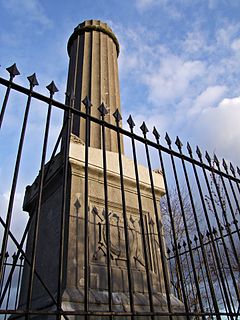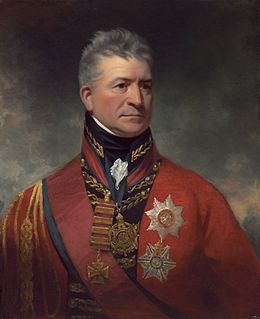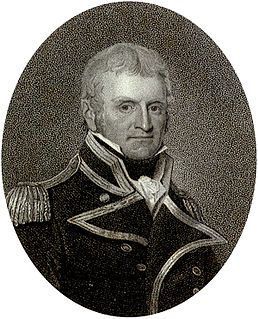 W
WCaptain Richard Bogue was an officer of the British Army, who commanded a Rocket Brigade company at the Battle of Leipzig, where he was killed.
 W
WJohn Cooke was an experienced and highly regarded officer of the Royal Navy during the American War of Independence, the French Revolutionary Wars and the first years of the Napoleonic Wars. Cooke is best known for his death in hand-to-hand combat with French forces during the Battle of Trafalgar in 1805. During the action, his ship HMS Bellerophon was badly damaged and boarded by sailors and marines from the French ship of the line Aigle. Cooke was killed in the ensuing melee, but his crew successfully drove off their opponents and ultimately forced the surrender of Aigle.
 W
WMajor-General Robert Craufurd was a British soldier. Craufurd was born at Newark, Ayrshire, the third son of Sir Alexander Craufurd, 1st Baronet, and the younger brother of Sir Charles Craufurd. After a military career which took him from India to the Netherlands, in 1810 in the Napoleonic Peninsular War he was given command of the Light Division, composed of the elite foot soldiers in the army at the time, under the Duke of Wellington. Craufurd was a strict disciplinarian and somewhat prone to violent mood swings which earned him the nickname "Black Bob". He was mortally wounded storming the lesser breach in the Siege of Ciudad Rodrigo on 19 January 1812 and died four days later.
 W
WColonel Sir William Howe De Lancey was an officer in the British Army during the Napoleonic Wars. He died of wounds he received at the Battle of Waterloo.
 W
WCaptain George Duff RN was a British naval officer during the American War of Independence, the French Revolutionary Wars and the Napoleonic Wars, who was killed by a cannonball at the Battle of Trafalgar.
 W
WLieutenant-Colonel Sir Richard Fletcher, 1st Baronet was an engineer in the British Army known for his work on the Lines of Torres Vedras. He fought in the French Revolutionary Wars and Peninsular Wars, and was mentioned in dispatches a number of times, most notably for his actions at Talavera, Busaco, Badajoz and Vitoria. Fletcher was twice wounded in the line of duty before being killed in action at the Siege of San Sebastian.
 W
WLieutenant-Colonel Sir Alexander Gordon was a Scottish officer in the British Army who was killed at the Battle of Waterloo. His correspondence was collated and published early in the early 21st century.
 W
WJames Hay, Lord Hay and Lord Slains was a British Army officer killed during the Waterloo Campaign.
 W
WMajor Hon. Frederick Howard was a British Army officer who fought in the Napoleonic Wars and was killed at the Battle of Waterloo. He is the "young, gallant Howard" mentioned in Lord Byron's poem "Childe Harold's Pilgrimage".
 W
WMajor-General John Gaspard Le Marchant was one of the finest British cavalry commanders of his generation; he was also an intellectual soldier who had a great influence on the efficient functioning of the army he served in. He was instrumental in the process which produced the first British military academy and staff college; and he saw active service in the French Revolutionary Wars and the Peninsular War until his death at the Battle of Salamanca.
 W
WMajor-General Henry MacKinnon, was a British soldier. He commanded the 45th Regiment of Foot, 74th (Highland) Regiment of Foot, and 88th Regiment of Foot in the Napoleonic Peninsular War under the Duke of Wellington. He was killed by the explosion of an enemy magazine during the Siege of Ciudad Rodrigo on 19 January 1812.
 W
WLieutenant-General Sir John Moore, was a British Army general, also known as Moore of Corunna. He is best known for his military training reforms and for his death at the Battle of Corunna, in which he repulsed a French army under Marshal Soult during the Peninsular War. After the war General Sarrazin wrote a French history of the battle, which nonetheless may have been written in light of subsequent events, stating that "Whatever Buonaparte may assert, Soult was most certainly repulsed at Corunna; and the English gained a defensive victory, though dearly purchased with the loss of their brave general Moore, who was alike distinguished for his private virtues, and his military talents."
 W
WVice-Admiral Horatio Nelson, 1st Viscount Nelson, 1st Duke of Bronté,, also known simply as Admiral Nelson, was an English flag officer in the Royal Navy. His inspirational leadership, grasp of strategy, and unconventional tactics brought about a number of decisive British naval victories, particularly during the Napoleonic Wars. He is widely regarded as one of the greatest naval commanders in history.
 W
WLieutenant-General Sir Thomas Picton was a Welsh officer of the British Army who fought in the Napoleonic Wars. According to the historian Alessandro Barbero, Picton was "respected for his courage and feared for his irascible temperament". The Duke of Wellington called him "a rough foul-mouthed devil as ever lived", but found him capable.
 W
WMajor-General Hon. Sir William Ponsonby was an Anglo-Irish politician and British Army officer who served in the Peninsula War and was killed at the Battle of Waterloo.
 W
WJohn Ross (1744–1809) was a British Army officer in the French and Indian War and the American Revolution. He is best known for commanding a mixed force of approximately 600 regulars, Loyalists, and Indians in a raid into upstate New York on October 24, 1781 that culminated in the Battle of Johnstown, one of the last battles in the northern theater of the American Revolution. After the war, Ross was instrumental in settling Loyalist refugees in what is now the Kingston area of eastern Ontario.
 W
WJohn Shortland (1769–1810) was a naval officer, the eldest son of John Shortland. Shortland joined the Royal Navy as a midshipman and went to Quebec in a transport commanded by his father. From 1783 to 1787 he served in the West Indies. In 1787 he was master's mate in the Sirius when the First Fleet sailed for Australia. Shortland spent nearly five years in Australia including time on Norfolk Island where Sirius was wrecked in 1790. In 1792 he returned to England.